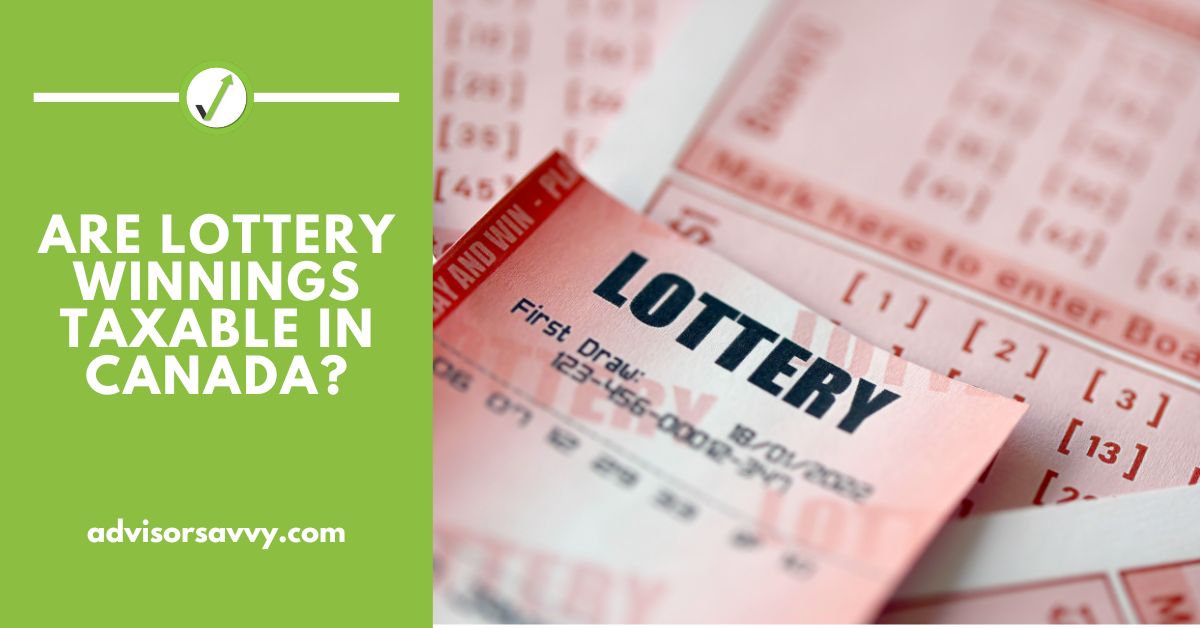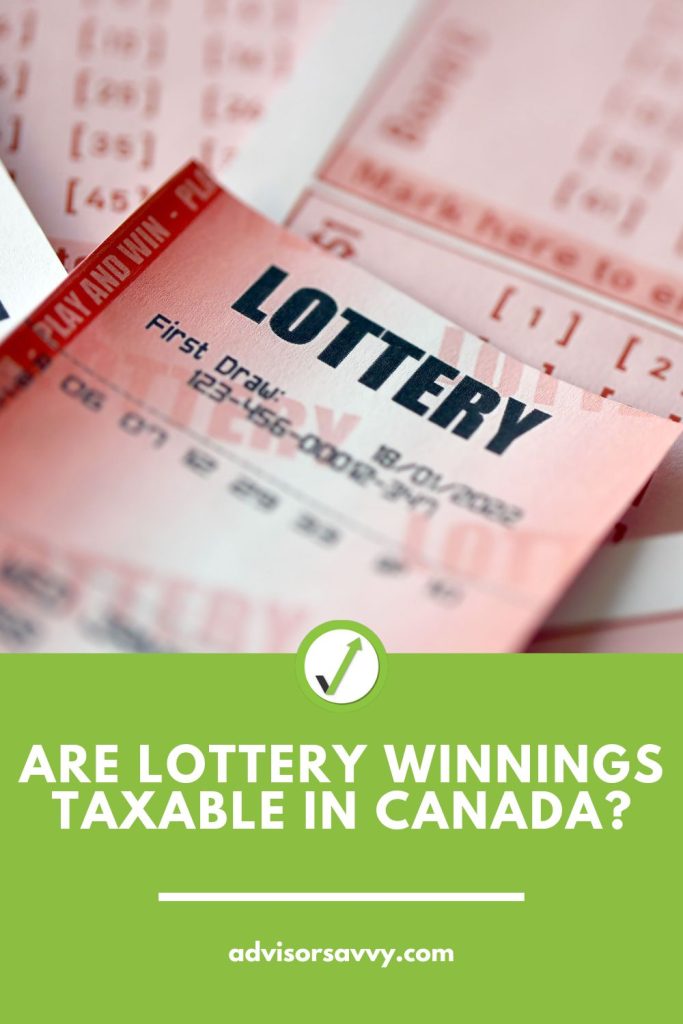
Ever buy those scratch card crosswords at the subway? You’re not the only one. The odd time you might win a cheeky $20, which you exchange at the stand like nobody’s business. But how much do you need to earn before it is somebody’s business? Say you win $1,000 or $100,000, or even $1,000,000. At which point does the government get involved, and how much do you owe in taxes? And are lottery winnings taxable in Canada?
Of course, you can find out this answer and much more in the average financial advisory meeting. That’s why Advisorsavvy exists — to connect you with financial advisors and improve your wealth, financial habits, and future. But for now, we know you just want Cole’s notes. Keep reading to understand lottery winning tax laws in Canada.

Table of contents
- What happens when you win the lottery in Canada?
- How much tax do you pay on lottery winnings in Canada?
- Do you have to announce you won the lottery in Canada?
- How long does it take to receive lottery winnings in Canada?
- Can you gift money from a lottery win?
- What should you not do after winning the lottery?
What happens when you win the lottery in Canada?
If you win a hefty lottery amount, a few things will happen. First, you’re allowed to celebrate. Take your family away for a while and just reflect on your good fortune and discuss plans for the future. Happiness is allowed — but when you win, negative attention comes with it. Some winners report being bombarded by friends, family members, and strangers with this sob story or that one, pitching elaborate requests for justified donations.

Match to your perfect advisor now.
Getting started is easy, fast and free.
Plus, lotto winners all over the world have become victims of fraudsters, facing immense losses and even lawsuits. Others fall victim to the lap of luxury that they couldn’t prepare for, either spending it in buckets or indulging in poor habits like gambling or alcoholism. Frankly, dealing with sudden wealth isn’t all sunshine and rainbows like one might expect.
Now, will you have to fork up any of your winnings? Keep reading to find out.
Related Reading: Tax Efficient Retirement Withdrawal Strategies in Canada
How much tax do you pay on lottery winnings in Canada?
Lottery winnings are considered “financial windfalls.” In other words, an unexpected surplus of cash. Licensed insolvency trustees at David Skylar & Associates share that windfalls could encompass lotto winnings, inheritances, or even government-funded grants.
The verdict? Canada doesn’t tax citizens on financial windfalls. Meaning? Pop the champagne because: Lottery winnings aren’t taxable in Canada.
If you win $100, $100,000, $1,000,000 or even $10 million in a Canadian lottery, you get to keep every last penny. Just keep in mind that any income you generate through those winnings is taxable come tax season. For instance, if you start a business with your new money and earn business income, that’s taxable. Or if you invest your winnings and receive dividends, that’s taxable too. However, the lottery winnings themselves are not taxable.

Match to your perfect advisor now.
Getting started is easy, fast and free.
Here’s an example to demonstrate:
Let’s say you won $1,000,000. You use that money to purchase a house in Toronto, and rent it out for $4,000 per month. You’re responsible for paying tax on that $48,000 of annual income, less any applicable expenses or tax deductions. Similarly, if you invest your money in a mutual fund, stocks, or other investment, you would still pay taxes on any returns or dividends you acquire from those investments.
Still, you might spend a little more from your initial win if you indulge the people who come out of the woodwork for a cheeky payout. Which brings us to our next question:
Do you have to announce you won the lottery in Canada?
In most cases, yes. Provincial lottery corporations often require publicized winner names for various reasons. The BCLC (British Columbia Lottery Corporation) cites that the publication of names helps maintain the lottery system’s integrity. In addition, lotteries want to publicize winners to encourage others to engage. If you want to remain anonymous, the corporation might consider your case if there are real security concerns — but it’s rare that they’ll make an exception.
This might feel scary, considering plenty of lotto winners have faced threats. Some people have even been murdered for their winnings in the United States.
Our advice? Close up your social circle once you claim your lottery prize. Get away for a while, and delete some of your social media accounts. You might not be able to escape the infamy a lotto win brings you right away, but you can at least lay low until the hype dies down.
Related Reading: Is CPP Taxable Income?
How long does it take to receive lottery winnings in Canada?
The answer depends on when you claim your prize! Lottery winners in Canada usually have up to one year to sign their tickets and claim their winnings. OLG says winners receive their payouts within five business days. Still, you should check the back of your lottery ticket or research each lottery corporation for more details about timelines.
Related Reading: How to Buy Stocks
Can you gift money from a lottery win?
We should hope so! It’s your money, so you can give it to whoever you want. Just don’t feel pressured by sudden, new best friends or distant relatives you haven’t spoken to in forever. At the end of the day, it’s your money and you can allocate it how you want to.
But you might wonder if your chosen recipient has to pay tax on any gifted lottery winnings. The answer is no — so you can happily gift some of your lottery winnings tax-free on all sides.
Remember, inheritances and gifts aren’t taxable in Canada anyway. So whether you gift money from your savings or the lottery, nobody has to pay tax on gifts.
Do you have to share lottery winnings with your spouse in Canada?
The gist is that if you’re living together and married, it’s likely you’ll have to share the winnings with your spouse. After all, most assets are shared within a marriage. Although, the answer depends on a few factors.
For starters, are you still together, married or common law? If so, your lottery winnings might be already considered half theirs because you won the lottery while engaged in a committed relationship. But if you’re divorced and won your lottery winnings afterward, your ex-spouse doesn’t have a claim to your lottery winnings.
Separations are where things might get dicey. Say you separate (but are not divorced yet) and win a lottery. Is your spouse entitled to half of it? It’s possible, especially if you didn’t have a prenuptial agreement in place. However, the courts have set multiple precedents where the answer isn’t always automatic. Ultimately, the final decision will depend on the unique circumstances of your decision and what each party in the marriage wants.
For example, one man won a $60 million lottery in Alberta. He shared $30 million with his common-law partner. Out of nowhere, her estranged husband (separated, not divorced) made a claim for half her winnings after being separated for eight years. The judge ruled that he wasn’t entitled to a penny — thankfully for her!
Another Ontario case saw a woman forced to split a lotto ticket halfway with her divorced husband. Why? Because they still lived together.
Our advice? Finalize prenups and cohabitation agreements with your partner so it’s abundantly clear what each of you are entitled to. Your best bet in protecting your lottery winnings is to prepare for your future — a financial advisor can help with that. But at the end of the day, lottery winnings are unpredictable and unplanned so splitting it with a spouse or partner may be inevitable.
Related Reading: Is OAS Taxable?

Match to your perfect advisor now.
Getting started is easy, fast and free.
What should you not do after winning the lottery?
The short answer? Take some time to mull things over and think about what you want. No sudden decisions.
Your first step is to consult a financial advisor or wealth manager. Many wealthy people work with a professional, especially when they’re not sure how to move forward with their finances. This way, you can lay out your goals and values for the money before making any sudden decisions. In addition, you have someone to check you if you’re being unreasonable in your decision making.
Here’s some good things to do with your new found wealth:
- Pay off your debts, as well as the debts of your family who you wish to help out
- Consider pursuing a lifelong dream that you were otherwise unable to do financially, like going back to school, traveling, buying your dream home or starting a business
- Continue to apply your good financial habits, like budgeting, saving and reasonable spending; just because you have more money now does not mean it’s infinite!
Here’s some things you shouldn’t do with your new found wealth:
- Spend money on things that don’t build wealth, like cars, clothes, experiences and other materialistic purchases
- Give money to anyone who asks; you don’t owe anyone despite what they might try to convince you
- Assume your money is infinite and never ending — budgeting and other core personal finance concepts still apply, you just have bigger numbers to play with
As a final piece of advice, billionaire investor Mark Cuban actually recommends not investing the money if you’re not skilled in the market: “You don’t become a smart investor when you win the lottery…You can put it in the bank and live comfortably. Forever.” He also advises against becoming a “human ATM” for friends and family. Instead, you should consult a financial professional or accountant before giving anything away.
Did you recently win the lottery? Congrats! Let us connect you with a financial advisor that’ll help you make sense of your newfound financial freedom.
Read More: How to Invest $1,000, $10,000 or $100,000

